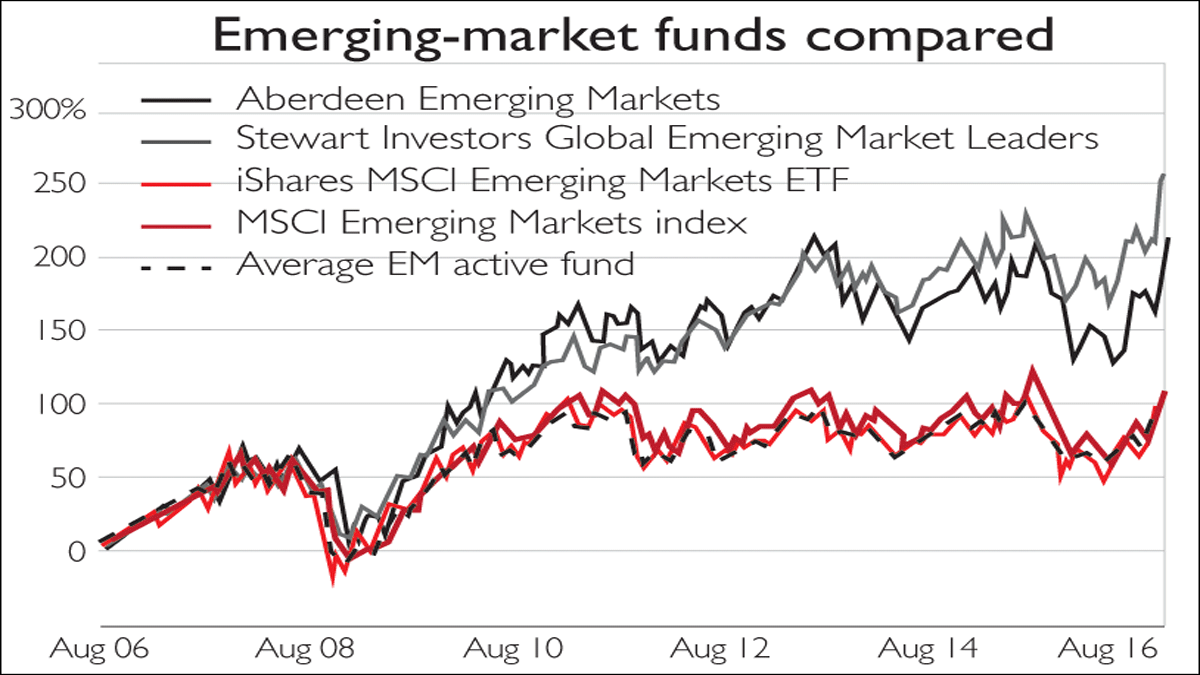Why passive pays in emerging markets
Many investors still prefer active funds when investing in emerging markets. But that, says Sarah Moore, may not be the best option.
Get the latest financial news, insights and expert analysis from our award-winning MoneyWeek team, to help you understand what really matters when it comes to your finances.
You are now subscribed
Your newsletter sign-up was successful
Want to add more newsletters?

Twice daily
MoneyWeek
Get the latest financial news, insights and expert analysis from our award-winning MoneyWeek team, to help you understand what really matters when it comes to your finances.

Four times a week
Look After My Bills
Sign up to our free money-saving newsletter, filled with the latest news and expert advice to help you find the best tips and deals for managing your bills. Start saving today!

Many investors who use low-cost passive funds for investing in developed markets still prefer actively managed funds when investing in emerging markets. They assume that because emerging markets are seen as more unstable, risky and inefficient, active managers will have more opportunity to beat the market through in-depth research and skillful stockpicking. But the evidence doesn't back this up, as James Connington points out in The Daily Telegraph. The majority of emerging-market funds with a ten-year record did no better than a low-cost tracker fund over that period.
It's true that some active funds outperformed spectacularly: Stewart Investors Global Emerging Markets Leaders returned 258% over ten years (see chart), while Aberdeen Emerging Markets returned 219%, compared with around 100% for the iShares MSCI Emerging Markets ETF, which tracks the MSCI Emerging Markets index. But the average performance for emerging-market funds was almost identical to that of the iShares index fund. And of the 31 funds with a ten-year track record, only ten beat the benchmark index.
What's more, comparing active managers to the benchmark gives an "unfair advantage" to the active side, Jamie Smith-Thompson of financial adviser Portafina tells The Daily Telegraph. The MSCI Emerging Markets index includes 836 out of around 10,000 listed emerging-market companies. However, active managers should be able to invest in any of the available stocks, including smaller firms that are likely to grow faster. This should give them even more opportunity to beat the index yet most still don't.
MoneyWeek
Subscribe to MoneyWeek today and get your first six magazine issues absolutely FREE

Sign up to Money Morning
Don't miss the latest investment and personal finances news, market analysis, plus money-saving tips with our free twice-daily newsletter
Don't miss the latest investment and personal finances news, market analysis, plus money-saving tips with our free twice-daily newsletter
Other studies come to the same conclusion: for example, data from S&P Dow Jones shows that the majority of emerging-market funds lag behind the S&P/IFCI index, its own emerging-market benchmark. So if you invest in emerging markets, ignore the conventional wisdom. Just as in developed markets, your starting point for comparison should be a cheap tracker, such as iShares Core MSCI Emerging Markets (LSE: EMIM).
You may then want to consider whether active funds with strong records such as those from Stewart Investors and Aberdeen will continue beating the market, but don't fall into the trap of assuming that any active fund is automatically a better bet. The evidence is clear: it isn't.
Get the latest financial news, insights and expert analysis from our award-winning MoneyWeek team, to help you understand what really matters when it comes to your finances.
Sarah was MoneyWeek's investment editor. She graduated from the University of Southampton with a BA in English and History, before going on to complete a graduate diploma in law at the College of Law in Guildford. She joined MoneyWeek in 2014 and writes on funds, personal finance, pensions and property.
-
 Should you buy an active ETF?
Should you buy an active ETF?ETFs are often mischaracterised as passive products, but they can be a convenient way to add active management to your portfolio
-
 Power up your pension before 5 April – easy ways to save before the tax year end
Power up your pension before 5 April – easy ways to save before the tax year endWith the end of the tax year looming, pension savers currently have a window to review and maximise what’s going into their retirement funds – we look at how